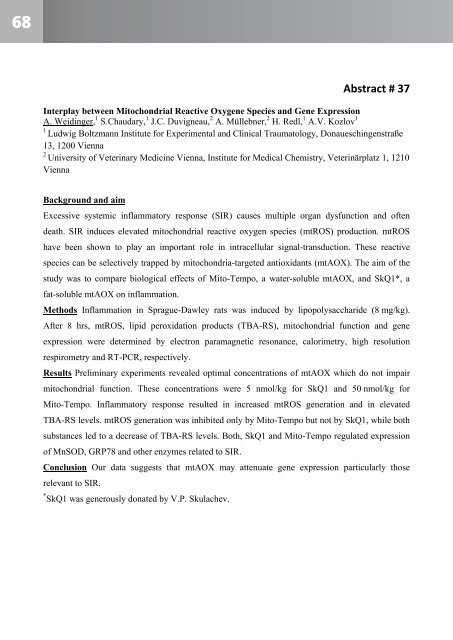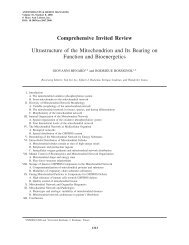MiPsummer Programme pdf - Mitochondrial Physiology Society
MiPsummer Programme pdf - Mitochondrial Physiology Society
MiPsummer Programme pdf - Mitochondrial Physiology Society
You also want an ePaper? Increase the reach of your titles
YUMPU automatically turns print PDFs into web optimized ePapers that Google loves.
68<br />
Abstract # 37<br />
Interplay between <strong>Mitochondrial</strong> Reactive Oxygene Species and Gene Expression<br />
A. Weidinger, 1 S.Chaudary, 1 J.C. Duvigneau, 2 A. Müllebner, 2 H. Redl, 1 A.V. Kozlov 1<br />
1<br />
Ludwig Boltzmann Institute for Experimental and Clinical Traumatology, Donaueschingenstraße<br />
13, 1200 Vienna<br />
2<br />
University of Veterinary Medicine Vienna, Institute for Medical Chemistry, Veterinärplatz 1, 1210<br />
Vienna<br />
Background and aim<br />
Excessive systemic inflammatory response (SIR) causes multiple organ dysfunction and often<br />
death. SIR induces elevated mitochondrial reactive oxygen species (mtROS) production. mtROS<br />
have been shown to play an important role in intracellular signal-transduction. These reactive<br />
species can be selectively trapped by mitochondria-targeted antioxidants (mtAOX). The aim of the<br />
study was to compare biological effects of Mito-Tempo, a water-soluble mtAOX, and SkQ1*, a<br />
fat-soluble mtAOX on inflammation.<br />
Methods Inflammation in Sprague-Dawley rats was induced by lipopolysaccharide (8 mg/kg).<br />
After 8 hrs, mtROS, lipid peroxidation products (TBA-RS), mitochondrial function and gene<br />
expression were determined by electron paramagnetic resonance, calorimetry, high resolution<br />
respirometry and RT-PCR, respectively.<br />
Results Preliminary experiments revealed optimal concentrations of mtAOX which do not impair<br />
mitochondrial function. These concentrations were 5 nmol/kg for SkQ1 and 50 nmol/kg for<br />
Mito-Tempo. Inflammatory response resulted in increased mtROS generation and in elevated<br />
TBA-RS levels. mtROS generation was inhibited only by Mito-Tempo but not by SkQ1, while both<br />
substances led to a decrease of TBA-RS levels. Both, SkQ1 and Mito-Tempo regulated expression<br />
of MnSOD, GRP78 and other enzymes related to SIR.<br />
Conclusion Our data suggests that mtAOX may attenuate gene expression particularly those<br />
relevant to SIR.<br />
* SkQ1 was generously donated by V.P. Skulachev.



